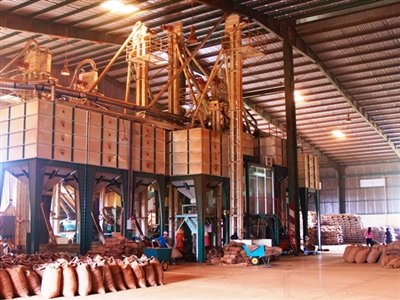VietNamNet Bridge – Hundreds of Vietnamese coffee companies have been perishing
in the home market, since foreign invested enterprises now corner the coffee
material sources which have been developed by the State and farmers for years.
 |
|
|
With more than 500,000 hectares of coffee, Vietnam can export more than 1.2 million tons of coffee beans every year. However, despite the big export volume, the export turnover is not big, because 90 percent of the exported volume is preliminarily treated products, sold at low prices. In 2011, Vietnam got 2.4 billion dollars from coffee exports, which is the highest export turnover level so far.
Therefore, in 2007, the government released the Decree No. 23, encouraging 100 percent foreign owned enterprises to set up their production bases in Vietnam. The enterprises are now allowed to collect coffee materials from farmers, while they can only focus on the processing stage.
With the decree, local authorities in the Central Highlands, the biggest coffee plant growing area in Vietnam, have opened their doors to foreign investors, offering a lot of investment incentives.
At the invitation of the country which is the Number 1 Robusta producer in the world, more and more “big guys” have arrived in Vietnam.
Nevertheless, the big guys have not been doing the things Vietnam wants them to do in Vietnam. Foreign invested enterprises have not invested in the processing in order to create valuable coffee products, but they have been simply trading coffee beans for profit.
They have big advantages in the competition with domestic companies to collect materials from farmers. They have huge capital, can borrow money at low interest rates. They do not have to share responsibility with farmers in case of risk due to the bad weather.
Especially, they do not have to spend money and make efforts to develop the material growing areas. What they have to do is just paying high prices to scramble for materials with domestic companies.
As such, the foreign invested enterprises have been easily dodged the laws, playing trickeries to control the material sources, thus pushing domestic companies against the wall. Especially, experts have warned that Vietnamese coffee brand may disappear in the world market one day, if foreign enterprises can absolutely control material supply sources.
The distinguished guests
Dakman was the first foreign invested coffee joint venture licensed in Dak Lak province, the coffee metropolis of Vietnam.
Licensed in 1995, the joint venture between the UK’s ED&FMAN, contributing 66.4 percent of total capital, and Vietnamese Simexco Dak Lak reported loss for many consecutive years, which meant that it did not have to pay the corporate income tax.
After Dakman, nearly 10 other foreign enterprises have been granted investment licenses by the Dak Lak provincial authorities. However, only one of them, an Indian company, has invested in the processing phase with its soluble coffee processing plant in Cu Kuin district. The 50 million dollar plant, which has the capacity of 10,000 tons per annum, began exporting its products in the first quarter of 2012.
Meanwhile, other foreign enterprises have been scrambling for coffee materials with domestic companies. The local authorities do not know how to deal with the foreigners, because they are considered the “distinguished guests.”
Meanwhile, they have got puzzled with the current different regulations: while the Decree 23 prohibits foreigners to buy goods directly from farmers, the Investment Law does not mention this.
Though the local authorities know that Neumann and Olam once bought hundreds of tons of coffee directly from farmers in 2009 and 2010, they could not punish them. In 2010-2011, the enterprises collected and exported 180,000 tons of coffee beans, or 50 percent of the coffee output of the province.
Source: Tien phong
How to re-arrange the chessmen on the coffee chessboard?